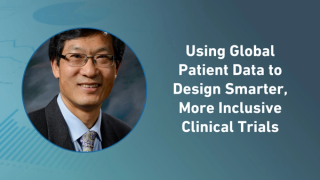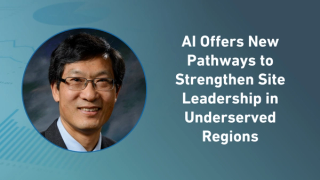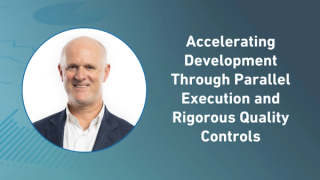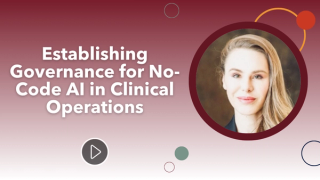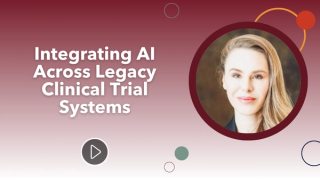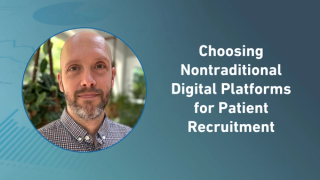
Technology
Latest News

Latest Videos

More News

In this Q&A, Randa Wahid of Indero, and Lyn Mursalo, a freelance clinical research professional, share how sponsors and CROs can build collaborative partnerships, navigate global trial complexities, and apply practical strategies to deliver studies on time and with quality.
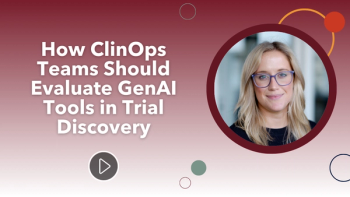
In this video interview, Adrianne Rivard, senior community development manager at myTomorrows, explains why compliance with privacy standards and physician training are critical for safe and effective use of GenAI in clinical trial discovery.
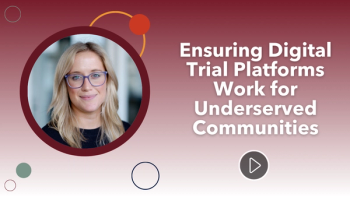
In this video interview, Adrianne Rivard, senior community development manager at myTomorrows, highlights how combining AI platforms with patient navigators can make trial-finding tools more equitable and accessible across diverse healthcare settings.

New guidance and technology advances are reshaping eClinical systems, positioning them as tools to accelerate enrollment, improve data quality, and reduce site and patient burden.

In this video interview, Adrianne Rivard, senior community development manager at myTomorrows, explains why unified, real-time trial platforms are essential for reducing physician burden and improving patient access to studies.

Aligning artificial intelligence with patient needs, trial workflows, and employee experience enables adoption, builds trust, and ensures AI delivers measurable impact across clinical operations.
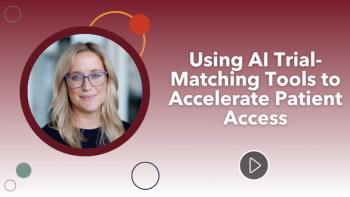
In this video interview, Adrianne Rivard, senior community development manager at myTomorrows, discusses how AI-powered pre-screening integrated into referral workflows can streamline eligibility checks and speed patient access to treatments.
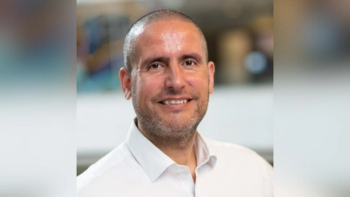
In this Q&A from the 2025 Veeva R&D and Quality Summit, Ibrahim Kamstrup-Akkaoui, vice president of data systems innovation at Novo Nordisk, discusses simplifying system use through the company’s DataNow program and taking a measured, stepwise approach to applying AI and automation across the clinical development lifecycle.

In this Q&A from the 2025 Veeva R&D and Quality Summit, Ibrahim Kamstrup-Akkaoui, vice president of data systems innovation at Novo Nordisk, discusses simplifying system use through the company’s DataNow program and taking a measured, stepwise approach to applying AI and automation across the clinical development lifecycle.

In this video interview, Adrianne Rivard, senior community development manager at myTomorrows, explains how AI can reduce the time physicians spend pre-screening patients for clinical trial eligibility.

In this video interview, Adrianne Rivard, senior community development manager at myTomorrows, explains how AI can reduce the time physicians spend pre-screening patients for clinical trial eligibility.

In this video interview, Sunny Kumar, MD, partner at Informed Ventures, explains how startups often underestimate the need for scalable platforms that fit into pharma workflows, limiting adoption of otherwise promising point solutions.

In this video interview, Sunny Kumar, MD, partner at Informed Ventures, discusses how FDA guidance and investor expectations are shaping resilient trial designs that use adaptive methods, virtual controls, and decentralization to lower costs and accelerate patient access.

In this video interview, Sunny Kumar, MD, partner at Informed Ventures, explains how organizational complexity, regulatory caution, and cultural risk aversion slow innovation in clinical trials, while tools like generative AI may help reduce operational barriers.

In this video interview, Sunny Kumar, MD, partner at Informed Ventures, discusses how clinical operations leaders can close technology gaps in decentralized trials by provisioning devices and designing simple, intuitive tools to ensure equitable patient access.

Craig Lipset, co-chair, Decentralized Trials & Research Alliance (DTRA), and Kyle McAllister, co-founder, CEO, Trially, discuss how research sites are navigating political funding pressures, adapting to NIH budget constraints, and leveraging new cost-containment strategies to sustain clinical research.

Strategic AI applications are helping life sciences teams overcome hidden bias, accelerate data discovery, and improve evidence integrity at the start of the pipeline.

Strategic AI applications are helping life sciences teams overcome hidden bias, accelerate data discovery, and improve evidence integrity at the start of the pipeline.

In this episode of the Applied Clinical Trials Brief, we spotlight a recent video interview in which Jon Walsh, founder and chief scientific officer of Unlearn.AI, shared how digital twins can improve trial efficiency, enhance patient-centric designs, align with regulatory expectations, and accelerate access to new therapies.

In this episode of the Applied Clinical Trials Brief, we spotlight a recent video interview in which Jon Walsh, founder and chief scientific officer of Unlearn.AI, shared how digital twins can improve trial efficiency, enhance patient-centric designs, align with regulatory expectations, and accelerate access to new therapies.

In this video interview, Meri Beckwith, Co-CEO of Lindus Health, shares practical ways clinical teams can strengthen trial protocols for expedited programs—such as incorporating control groups where possible, leveraging synthetic and real-world data, and adopting adaptive trial designs to reduce regulatory risk.

In this Q&A, Rohit Nambisan, CEO of Lokavant, and Jonathan Crowther, head of predictive analytics, Pfizer, explore how AI is transforming study feasibility, regulatory review, and trial execution.

Jon Walsh, founder, chief scientific officer, Unlearn, explains how AI and digital twins are helping clinical trials become more efficient, patient-centric, and capable of supporting innovative study designs over the next decade.

In this episode of the Applied Clinical Trials Brief, we spotlight a recent video interview with Luke Wilson of Thermo Fisher Scientific in which he shared insights on how data visibility, remote monitoring, and integrated systems can streamline inspections, improve patient safety, and keep decentralized trials compliant and on track.

Jon Walsh, founder, chief scientific officer, Unlearn, explains how AI and digital twin technologies are being applied to improve data transparency, ensure reproducibility, and strengthen the reliability of clinical trial outcomes.





